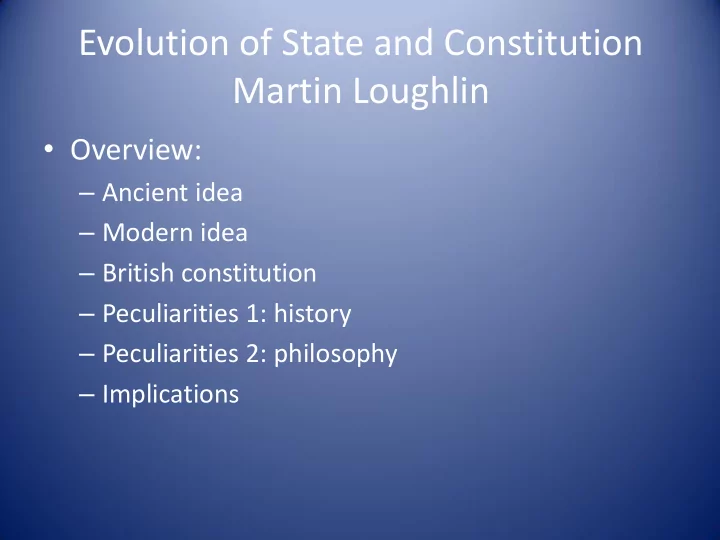

Evolution of State and Constitution Martin Loughlin • Overview: – Ancient idea – Modern idea – British constitution – Peculiarities 1: history – Peculiarities 2: philosophy – Implications
Ancient Idea of Constitutions • G.W.F. Hegel, The Philosophy of Mind (1830) – ‘What is … called “making a constitution” is … a thing that has never happened in history; a constitution only develops from the national spirit.’
Modern Idea of Constitutions • Alexander Hamilton, The Federalist (1787) – ‘It has been … reserved to the people of this country to decide an important question … whether societies of men are really capable or not of establishing good government from reflection and choice … or whether they are forever destined to depend for their political constitutions on accident and force.’
Characteristics of Modern Constitutions • The constitution is a construction • The constitution is a text • The constitution is fundamental law
Nature of British Constitution • Tocqueville, Democracy in America (1835): – ‘In England, the constitution may change continually, or rather it does not in reality exist; the Parliament is at once a legislature and constituent assembly.’ – The principle of Parliamentary sovereignty
Peculiarities 1: History • Modern constitutions = a product of Enlightenment thinking • Created in aftermath of war, revolution, independence; transition to democracy etc • No fundamental breakdown in political order since 17 th century • But: basic changes to the structure of the state? England, Great Britain, UK
Peculiarities 2: Philosophy • Michael Oakeshott – 2 sorts of knowledge • ‘Scientific’: – can be formulated into rules and taught and learned • ‘Practical’: – Traditional; not taught and learned so much as imparted and acquired by participants • The Error of Rationalism
Implications • The common law: lex non scripta • The unwritten constitution: common law mentality applied to practices of government • Question: can anti-rationalist constitutional arrangements be sustained in a world of rationalist politics and administration?
Recommend
More recommend